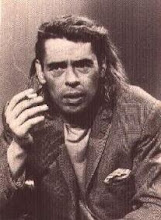Born To Be Wide is a monthly happening, a club that is not a club, an informal gathering of the ill informed and inquisitive in and about Scotland's musical and artistic goings on.
Orignally devised by strangely European music journalist Olaf Furniss and rugby enthusiast/record company talent scout Brodie Smithers, it has taken place in The Venue, The Street, and now The Voodoo Rooms in Edinburgh.
The pair have been aided and abetted by video director and facial hair pioneer Martin Smith, but currently Olaf is flying the flag solo.
Last night he staged the latest in the new BTBW development, industry panels preceding the mild hedonism and card swapping the inevitably follows.
Walking into the upstairs former ballroom at the old Cafe Royal, where Princess Margaret was alleged to have favoured for her under the radar trysts back in the day, was extraordinary.
Under the broad banner of how to get your music played on the radio, the fearless Furniss had put together an on stage line-up of wireless movers and shakers.
The venerable Vic Galloway, BBC Radio Scotland's walking talking outlet for all things nouveau who also does his Radio 1 in Scotland thing. Duncan Campbell, programme controller of Forth 1 and 2 in Edinburgh, John Paul McGroarty of Leith FM, and Tallah Brash of Fresh Air.
Vic, who must only buy jackets with multiple pockets to accommodate all the CD's and pen drives that get thrust in his face when attending such events, clearly represented the best chance of exposure to a wide audience.
John Paul could not contain his passion for both his station and the music it plays. "There is not a band in Leith that I have not seen or heard," he said, and you would not doubt him.
The station's connection to the Leith Festival provides a platform to showcase this relationship with local musicians.
Aussie born Duncan Campbell is a big fish - programme director at GCap Media no less - who moved to Bauer Media as their regional programme head honcho across Scotland. But his nominal responsiblity is the relatively small pool that is Radio Forth.
Since arriving in May last year, he has been responsible for removing the one programming area which offered a slight glimmer of hope to the audience gathered here tonight.
Rather than Bauer's Scottish stations running their own dedicated programming from early evening to 6am, all now take one syndicated show originating from Glasgow.
A move incidentally which also wipes out a day part where new broadcasting talent has traditionally cut its teeth.
Duncan plays the straightest of corporate bats, telling it like it is. Unless you are on a major label, forget about a playlisting at Radio Forth. If this news comes as a crushing blow to all the independent music makers in the room, they mask it with stunned indifference.
Duncan tells them Katy Perry is the sort of artist the station likes, and will playlist her singles until the cows come home. And probably even after singles stop being physically released.
Their extensive research tells them it is the right thing to do. Not listening to the song or anything silly then deciding if it will make the station sound better.
Research conducted while standing on a street corner and asking folk what they think of absurdly tight rotation of a limited number of songs might reveal even more interesting statistics. They don't like it. They switch off. Has RAJAR not given a glimpse of that?
American and Australian commercial models swear by playing the most popular hits more than once every couple of hours. UK audiences have never been comfortable with that.
The irony is that the venue for the seminar is the self same place where Radio Forth RFM (as it was absurdly called) staged some of the best radio musical moments in the history of commercial radio here or anywhere else.
Listeners could obtain free tickets to see the likes of Tori Amos, Evan Dando, Boo Hewerdine or Hue & Cry play the Cafe Royal's 150 capacity room in the early 1990's. Then listen to the event captured on the station's Live On Tour series.
The goodwill generated by such a promotion far exceeded any holiday or cash giveaways.
Maybe I am biased having been the station's music controller at the time, but the playlisting policy reflected a similar sense of adventure.
Revered radio guru Richard Park remarked that he was amazed Forth got such good audience figures playing such edgy diverse songs.
But that was then, and this is very much the corporate now. Leith FM is an imperfect diamond in that dustbin of networked uniformity, and has a much closer connection with its modest audience as a result.
It is what real radio is all about. It has the personality which has been drained from what were formerly known as Scotland's local stations.
As a footnote, Olaf Furniss used to be a regular listener to the indie music show I presented on Radio Forth in the Eighties. What he is doing now suggests the programme was doing something right.
Keep touching that dial.
Friday, 6 February 2009
Subscribe to:
Post Comments (Atom)

2 comments:
Ah the gig where a well refreshed Evan Dando kept walking away from the microphones. Great in the room, but a nightmare if you were trying to edit it!
I think the corporates have a point - they're in a business. I'm certain that the community stations (not the BBC) offer the best hope for both new on-air talent and new artists to get heard.
But they'll need to market themselves and work harder on developing talent. Do that right and they'll become a thorn in the side of the groups.
J
Very well written sir, are you some sort of professional?
Post a Comment